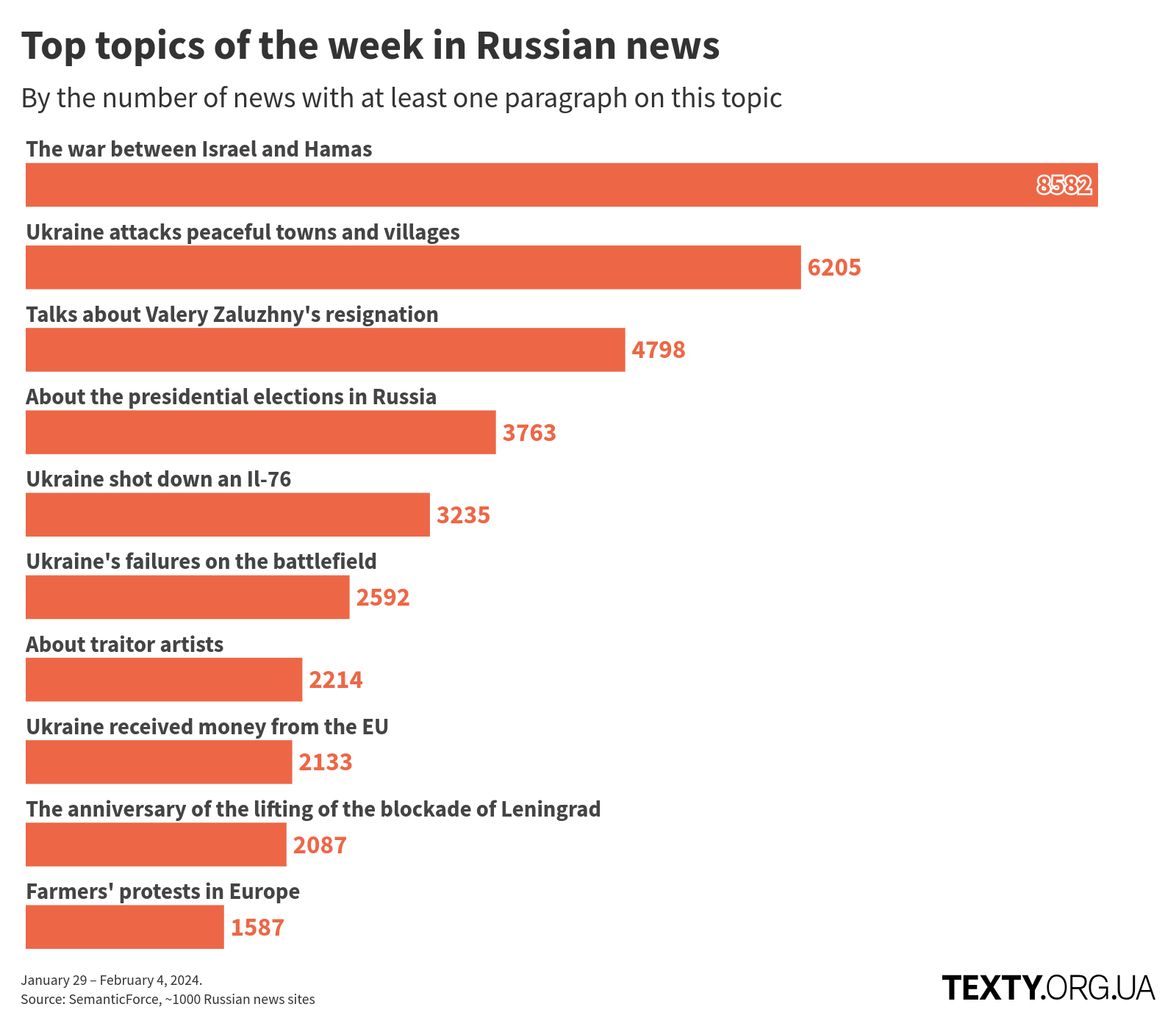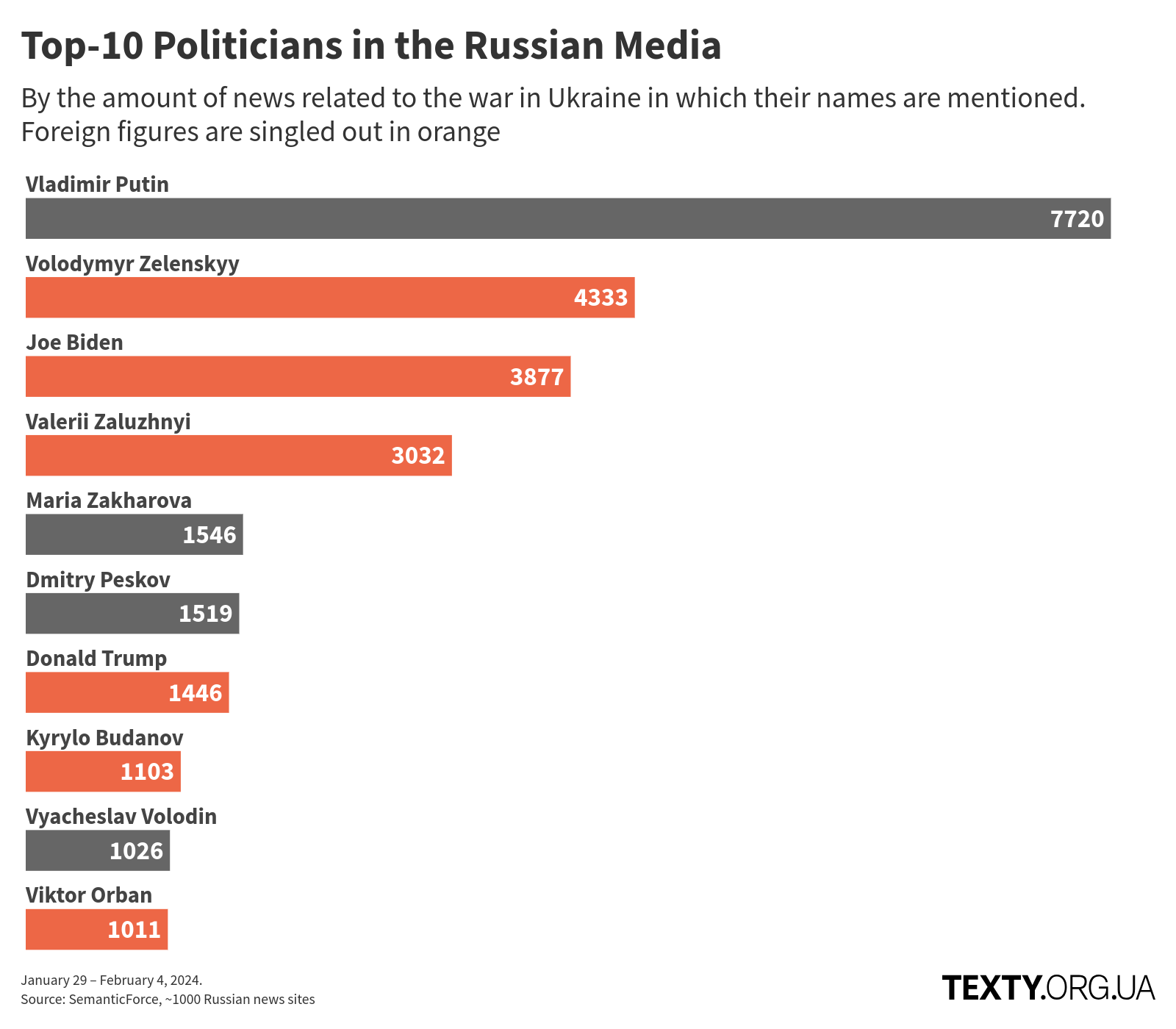Zaluzhny, Eggs and Organ Harvesting. Russian Media Monitoring Report, 29 January-4 February 2024
Last week, Russian media accused Ukraine’s allies of supplying weapons to Kyiv. The propagandists argued that the West wants to eradicate Russians which is why it allows Ukrainians to shoot down planes or target bakeries. Some Russian officials even claimed that Western weapons supplied to Ukraine were manned by American operators while the Ukrainians were only used in support roles.
Читати українською

Russian media also paid considerable attention to the possible resignation of Valery Zaluzhny and spread the old fake about the operations of organ harvesting units in the AFU being covered up by the central government.
This monitoring report covers these and other topics of the disinformation spread by Russian state media and online parajournalists to manipulate public opinion.
Zaluzhny’s Drinking Problem
Russian propaganda is staying focused on the latest news trends. Just like Ukraine’s media, they actively discussed the possibility of the Commander-in-Chief of the Armed Forces of Ukraine, Valery Zaluzhny's resignation last week.
The disinformers were happy to report that Zaluzhny’s days in office were counted. The rumors that “Colonel-General Aleksandr Syrskyi turned down the offer to replace Valeriy Zaluzhnyi after Chief of the Main Directorate of Intelligence of the Ministry of Defense of Ukraine Kirill Budanov” only added to their optimism. In their opinion, such reluctance shows that Ukraine’s top brass are disillusioned and do not want to captain a “sinking ship”.
At the same time, Russian media spread various versions of why Zaluzhny was bound to be fired and tried to explain why he was still there.
The discharge was said to be imminent because:
- Valery Zaluzhny’s realistic assessment of Ukraine’s capabilities contradicts Zelensky's picture seen through rose-colored glasses.
According to one version, Zaluzhny has been engaged in secret peace negotiations over Zelensky's head for six months. The peace talks were, of course, with Washington, not Russia. In other words, Zaluzhny was claimed to be asking for Washington’s approval for a truce because the commander-in-chief did not believe in a victory over Russia.
- Zelensky seeks to remove any official or politician who might rival his popularity.
- Zaluzhny has a drinking problem: “People’s deputy of Ukraine Maryana Bezuglaya linked Zaluzhny’s possible removal as the Comander-in-Chief of the AFU with serious health problems aggravated by alcoholism”.
The venomous personal criticisms of Zaluzhny and the military leadership by Ukrainian MP Maryana Bezuhla often end up on the pages of Russian media. They are used in an information campaign to discredit Zaluzhny, Zelensky, and Ukraine. This is an example of the enemy using the statements of Ukrainian politicians to further its own goals:
According to Russian disinformation media, the dismissal is being delayed because:
Ukraine’s international partners have sided with Zaluzhny: “The international partners including the US and the UK have expressed their concerns, and the pressure made the Ukrainian leader back down on his decision”.
Zelensky cannot find a replacement for the Commander-in-Chief: “Kiev simply has not been able to find a replacement for Zaluzhny”.
Ukraine’s leadership realizes that his resignation may as well trigger a new Maidan or a mutiny in the military who support of the popular general.
The fear of a political war with Zaluzhny: “Ukrainian President Vladimir Zelensky’s administration is afraid of a political confrontation with the commander-in-chief”.
Infernal Strike on Bakery
Russian media continue covering the shooting down of the IL-76 transport aircraft in Belgorod oblast.
The accusations are nothing new: the Ukrainians and the Americans acted together. Ukraine is being claimed to have killed their military with U.S.-made weapons that Russia intended to exchange: “The plane was shot down with a guided missile fired from a MIM-104A Рatriot system”.
Russian authorities are using the event to exert media pressure on Western countries to stop supporting Ukraine: “Russian MPs demand to condemn the criminal regime and stop arms supplies to Ukraine", “Volodin emphasized that U.S. congressmen ought to know how the American weapons sent to Ukraine are being used”.
Some Russian MPs took it even further and directly blamed the U.S. military for the attack on the IL-76: “The command and control and missile guidance stations are being manned by Western specialists including Americans” adding that Ukrainian military are only involved as drivers or transporter vehicle personnel”.
The strike on the occupied Lysychansk on February 3 was presented by Russian media as an atrocious crime committed by Ukraine and the USA with American weapons: “Another heinous crime of the Kiev regime. Ukrainian terrorists targeted peaceful Lisichansk with American HIMARS rockets. The building that housed a bakery and a small café has been destroyed”.
The Russian occupiers claimed “a missile strike on a bakery” causing 28 civilian deaths. The propaganda built a whole media campaign on the fact and accused Ukraine of violating the rules of warfare and committing atrocities against civilians in the “new regions of Russia”.
Eventually, it became known that the bakery was not the actual target of the strike while the victims were not exactly civilians.
According to Petro Andriushchenko, an advisor to the mayor of Mariupol, the rockets hit a cafe next to the bakery where local collaborationists had gathered. Moreover, the bakery soon resumed normal operation.
Later, it turned out that a collaborationist, the so-called Minister of Emergency Situations of the LPR, had been killed in the strike. The death was reluctantly confirmed by the leader of the self-proclaimed “LPR” Leonid Pasichnyk.
Journalist Denys Kazansky also pointed out that Russian military propagandist Anastasiya Kashevarova had reported a heavy presence of local law enforcement personnel at the cafe where the head of the LPR Ministry of Emergency Situations had been last seen. There were almost no survivors.
The Organ Harvesting Fake
Along with using more recent creations, Russian disinformation media keep revisiting some hackneyed old fakes. In particular, last week, Russian media reported on the discovery of consent forms for organ harvesting from the military: “The discovered consent forms for the extraction of homografts had all been filled out on behalf of AFU servicemen in 2022. All the papers are completed in the same handwriting and the same signature is stamped instead of the donor’s handwritten signature”.
“Livers and kidneys were extracted on site using mobile operating rooms installed on trucks. The materials were then placed in containers and moved for further transplantation in the West. The organ snatchers used warm container technology” (we would like to refrain from providing further details so as not to contribute to spreading fakes).
Russian media did not hesitate to mention that such incidents had been reported by the Russian Security Council Secretary Nikolai Patrushev back in the summer of 2023.
The illegal organ harvesting was once again claimed to be covered up by the “authorities”.
Such fakes have been circulating in the Russian information space since the beginning of the Russian invasion in 2014.
Putin's Election Campaign
One of the core narratives of Putin’s election campaign is that the West and NATO are aiming to destroy Russia. Putin is claimed to be the only person capable of stopping it because “the Anglo-Saxons will not stop the proxy war against Russia even after the end of the “hot phase” of the conflict in Ukraine”. This claim has been exploited for years.
Within this context, Ukraine is portrayed as a NATO outpost, an area under anti-Russian influence, and a springboard for an offensive on Russian territory.
It is for that very reason that Putin insists that “it is necessary to push back the demilitarized line in Ukraine to ensure the security of peaceful residents”. “The demilitarized line should be far enough from Russian territory to prevent Ukraine from targeting the population with long-range artillery”.
Putin’s support group echoes the leader’s claim that Russia cannot be defeated and assures that NATO troops will be instantly destroyed if they stand up to Moscow: “If they as much as put one foot into Ukraine, I would assume Russia to destroy any NATO units immediately. A nuclear strike against these units is not ruled out, albeit as a last resort”.
The Problems
As the so-called presidential election campaign is gathering speed in Russia, Russians are being convinced about the country’s achievements under Putin’s rule. At the same time, the media can no longer keep quiet about some problematic issues.
Dropping energy exports
Russia's energy exports are falling: “In January, Russia’s gasoline exports fell by 37% compared to 2023 figures while diesel exports fell by 23%.” Nevertheless, the news media say this is good for ordinary Russians: the more exports fall, the more products appear on the domestic market.
Export disruptions are in particular related to Ukraine’s deep strikes into Russia such as the recent attack on the “NOVATEK-Ust-Luga” production complex which resulted in “the suspension of some operations”. According to Russian media, the suspension is due to “unscheduled repairs at the factories”. “The Ministry of Energy of the Russian Federation is working together with oil companies and transport organizations to compensate for the shortfall of motor gasoline supplies which was caused by unscheduled repairs at refineries”.
Sanctions from Friends
Russian media appear to be unhappy to report on the sanctions from time to time imposed by countries that are presented as friendly in Russia.
Here is an example of such a report on Russian media last week: “Turkish exporters of goods are complaining about the refusals of banks to accept money transfers from Russia. The transactions have nearly ceased since 1 January ... The problem with payments, which has existed since the beginning of the year, is partly due to the pressure on Turkey in connection with Western sanctions”, “Turkish banks have tightened their policy towards Russian clients: some financial organizations started to close corporate accounts and increased due diligence requirements for individuals seeking to get a card”.
Even so, Russian officials and experts are reassuring that if not Turkey than China will remain friendly to Russia: “The difficulties in settlements with Turkey caused by Washington’s pressure on Ankara may lead to a reduction in the volume of bilateral trade and partial reorientation to other markets including China”.
Finally, on the subject of eggs...
Russian media are still concerned about the eggs and chicken crisis in Russia as the prices have risen significantly. Many expected the long-awaited price reduction after the information about new imports from Belarus, Turkey, and Azerbaijan, but the rapid price drop never materialized: “The prices of chicken eggs in Russia fell by 1% and chicken meat — by 0.5% over the week”. At the end of 2023, the prices of those products increased by 60%.

The Methodology
To monitor the information published on disinformation websites, we analyzed approximately 500,000 news reports collected from ~ 1,000 Russian websites. The data for the analysis was collected and provided by SemanticForce.
Each paragraph was processed using an algorithm that defines its topic automatically. The resulting topics (i.e. groups with similar content) were short-listed by the topics relating to the war or its consequences for Russia. The number of mentions of a certain topic was then counted for each publication. Our conclusions are based on the respective findings and the quotes from paragraphs referring to each topic.


